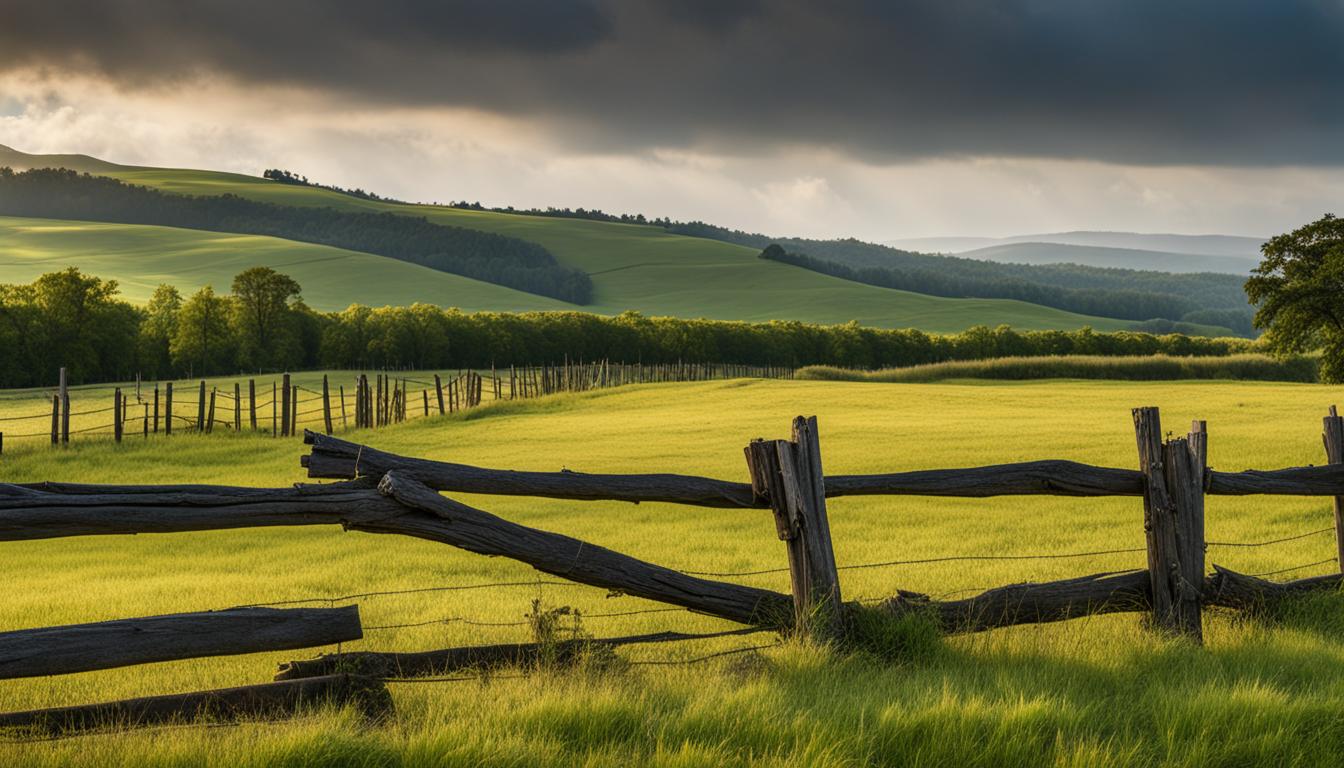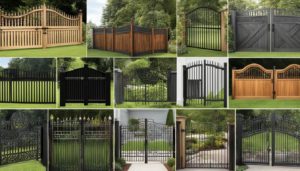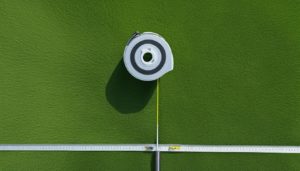Fences serve practical purposes such as privacy, noise reduction, and security, while also adding to the aesthetic appeal of a property. When choosing a fence, it is crucial to consider the longevity of the material. Vinyl fences are an excellent choice as they can last over 30 years with minimal maintenance. Vinyl is weather-resistant, resists rot and rust, and requires no regular treatments. Other long-lasting options include aluminum, steel, and wrought iron fences, but they require more extensive maintenance and come at a higher cost. Wood fences can also last, but they require regular maintenance and are susceptible to moisture damage.
Key Takeaways:
- Vinyl fences are the longest lasting option, lasting over 30 years with minimal maintenance.
- Other long-lasting options include aluminum, steel, and wrought iron fences, but they require more maintenance and are costlier.
- Wood fences can also last, but they require regular maintenance to prevent moisture damage.
- Consider your specific needs, budget, and aesthetic preferences when choosing a fence that will last for years to come.
Vinyl Fences: The Longest Lasting Option
When it comes to longevity, vinyl fences are the top choice. With proper maintenance, they can last over 30 years, making them a durable and cost-effective option for homeowners. Vinyl is known for its exceptional durability and resistance to weather, rot, and rust, ensuring that it can withstand common fence vulnerabilities. This makes vinyl fences an excellent investment for those looking for a long-lasting fencing solution.
One of the key advantages of vinyl fences is their low maintenance requirements. Unlike other materials, vinyl fences do not need regular treatments or repairs. Simply hosing off the fence with soap and water is sufficient to remove any mildew or mold that may accumulate over time. This hassle-free maintenance routine allows homeowners to enjoy their vinyl fence without the stress of constant upkeep.
In addition to their durability and low maintenance, vinyl fences also offer versatility in terms of style and color options. Homeowners can choose from a variety of designs and colors to match their personal taste and complement the overall aesthetic of their property. This versatility, combined with the fence’s longevity, makes vinyl fences a popular choice among homeowners.
Table: Vinyl Fence Durability and Maintenance
| Material | Durability | Maintenance |
|---|---|---|
| Vinyl | Over 30 years | Minimal maintenance, hose off with soap and water |
| Wood | Varies (10-30 years) | Regular maintenance, staining or painting every two years |
| Aluminum | 20-30 years | Moderate maintenance, periodic cleaning and repainting |
| Steel | 25-30 years | Extensive maintenance, regular painting and rust prevention |
| Wrought Iron | Up to 50 years | High maintenance, sanding, painting, and rust prevention |
In conclusion, vinyl fences are the longest lasting option available for homeowners. Their durability, low maintenance requirements, and versatility make them an excellent choice for those looking for a fence that will stand the test of time. While other materials like wood, aluminum, steel, and wrought iron can also last for many years, they generally require more extensive maintenance and come at a higher cost. When considering a fence that offers both longevity and ease of maintenance, vinyl fences are the clear winner.
Other Long-Lasting Fence Options
While vinyl fences are known for their exceptional longevity, there are other options to consider if you’re looking for a durable and long-lasting fence. These alternatives include aluminum, steel, wrought iron, and wood fences. Each material has its own unique characteristics and maintenance requirements.
Aluminum Fence
Aluminum fences are popular for their durability and resistance to rust and corrosion. They are lightweight yet sturdy, making them an excellent choice for both residential and commercial properties. Aluminum fences require minimal maintenance and can last for many years with proper care.
Steel Fence
Steel fences are incredibly strong and offer exceptional security and longevity. They are resistant to impact and can withstand harsh weather conditions. However, steel fences require regular maintenance to prevent rust and corrosion. With proper upkeep, steel fences can last a lifetime.
Wrought Iron Fence
Wrought iron fences are renowned for their elegance and durability. They are incredibly sturdy and can withstand extreme weather conditions. However, wrought iron fences require regular maintenance to prevent rust and keep them looking their best. With proper care, a wrought iron fence can last for several decades.
Wood Fence
Wood fences provide a classic and natural look to any property. While they can last for many years, wood fences require regular maintenance to prevent rot and decay. Staining or painting the wood every two years is necessary to protect it from moisture damage. The lifespan of a wood fence may vary depending on the type of wood used. Cedar is the most durable option, lasting around 30 years, while spruce and pine have shorter lifespans.
| Fence Material | Lifespan | Maintenance |
|---|---|---|
| Vinyl | Over 30 years | Minimal maintenance |
| Aluminum | Many years | Minimal maintenance |
| Steel | A lifetime | Regular maintenance to prevent rust |
| Wrought Iron | Several decades | Regular maintenance to prevent rust |
| Wood | Varies (Cedar: 30 years, Spruce: 10 years, Pine: 5-10 years) | Regular staining or painting every two years |
When choosing a long-lasting fence, it’s essential to consider factors such as durability, maintenance requirements, and aesthetic appeal. Vinyl fences offer the longest lifespan with minimal maintenance, making them an ideal choice for many homeowners. However, if you prefer the look of aluminum, steel, or wrought iron, be prepared for regular maintenance to ensure their longevity. Wood fences can also be a great option if you’re willing to invest in regular upkeep. Ultimately, the choice of a long-lasting fence material depends on your specific needs, budget, and desired aesthetic.
Maximizing Fence Longevity
Proper maintenance and timely repairs are essential for maximizing the longevity of your fence. By following these tips, you can ensure that your fence remains sturdy and attractive for years to come.
Regular Maintenance
Maintaining your fence regularly is key to preventing issues that can lead to structural damage. For vinyl fences, a simple cleaning with soap and water is usually sufficient to remove dirt, mildew, or mold. Avoid using abrasive cleaners or tools that could scratch the surface of the vinyl. Additionally, inspect the fence periodically for any signs of wear or damage, such as loose panels or sagging posts.
Addressing Repairs Promptly
If you notice any issues or damage, it’s crucial to address them promptly to prevent further deterioration. For vinyl fences, small cracks or breaks can be repaired using a vinyl repair kit. In the case of more significant damage, consult a professional to ensure proper repairs or replacements. Ignoring repairs can lead to more extensive damage and compromise the integrity of your fence.
Planning Tips
When installing a new fence, careful planning can help prolong its lifespan. Consider the surroundings and make sure to clear the area of any debris or potential hazards. Trim back trees and plants that could cause damage to the fence or create excessive moisture. Properly prepare the ground to provide a stable foundation for your fence, ensuring it remains upright even in extreme weather conditions.
| Fence Maintenance Tips | Fence Repair Tips | Planning Tips |
|---|---|---|
|
|
|
By following these maintenance, repair, and planning tips, you can maximize the longevity of your fence, ensuring it remains an attractive and functional addition to your property. Vinyl fences, in particular, offer the advantage of low maintenance and durability, making them an excellent long-lasting option for homeowners.
Conclusion
When it comes to fence longevity, finding the best fencing material is essential. After considering various options, it is clear that vinyl reigns supreme. Vinyl fences offer unmatched durability, longevity, and low maintenance, making them a wise investment in the long run. With a lifespan of over 30 years and minimal upkeep requirements, a vinyl fence is the most durable choice for homeowners.
While aluminum, steel, and wrought iron fences are also long-lasting options, they do require more maintenance and come at a higher cost. These materials can last for decades with proper care, but they may not be as cost-effective as vinyl in the long term. Moreover, wood fences can last if well maintained, but regular upkeep to prevent moisture damage is necessary. When considering fence longevity, vinyl stands out as the clear winner.
To choose the best fencing material for your needs, it’s important to consider your specific requirements, budget, and aesthetic preferences. By selecting a durable fence that requires minimal maintenance, you can enjoy peace of mind and avoid unnecessary stress. Whether you prioritize longevity, cost-effectiveness, or aesthetic appeal, a vinyl fence is the ideal choice for a durable and long-lasting investment.
FAQ
What are the benefits of vinyl fences?
Vinyl fences are the longest lasting option, lasting over 30 years with minimal maintenance. They are weather-resistant, do not rot or rust, and require no regular treatments. Vinyl fences also come in various styles and colors, offering versatility and aesthetic appeal.
What are some other long-lasting fence options?
Other long-lasting fence options include aluminum, steel, and wrought iron fences. These fences can last for decades, but they require more maintenance and come at a higher cost. Wood fences can also last, but they require regular maintenance and are susceptible to moisture damage.
How do I maximize the longevity of my fence?
To maximize fence longevity, it is important to perform regular maintenance and repairs promptly. For vinyl fences, protect the surrounding area before installation to prevent damage from falling debris and mold. Trim back trees and plants to avoid damage from branches and roots. Promptly address any repairs to prevent worsening damage.




